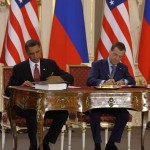The High Costs of Obama’s Nuke Deal
 Getting a nuclear deal with Russia involved costly concessions. If Russia fails though to cooperate on imposing sanctions on Iran, the deal will be a diplomatic loss for the Obama administration, no matter how many Russian warheads are eliminated.
Getting a nuclear deal with Russia involved costly concessions. If Russia fails though to cooperate on imposing sanctions on Iran, the deal will be a diplomatic loss for the Obama administration, no matter how many Russian warheads are eliminated.
Concluding an arms-reduction treaty between the United States and Russia is a laudable achievement for the Obama administration, provided the United States retains the right to maintain a modern nuclear deterrent and anti-missile defenses necessary for its national security. But the pact is likely more symbolism than substance in addressing many of the fundamental issues facing the United States in connection with Russia and nuclear proliferation.
The threat posed by the Soviet nuclear arsenal during the Cold War was Armageddon. While Russia still has more than enough warheads to wipe out the United States and its allies, today’s biggest concern is nuclear security. The treaty makes the world more secure especially to the extent the reduction in Russia’s stockpile and a renewed inspections regime decreases the likelihood of Russian nuclear weapons falling into the hands of rogue states and terrorists. Unfortunately, Russia may continue to pose problems in significant ways the treaty cannot address.
Getting to the negotiating table with Russia involved costly concessions, such as scaling back international anti-missile defense plans and betraying U.S. allies in the Czech Republic and Poland. Czech and Polish leaders risked political opposition at home and antagonizing Russia abroad to participate in the anti-missile defense network. Last September, the United States abruptly canceled parts of the program on Czech and Polish soil, much to Russia’s satisfaction. This move was harmful not just to anti-missile defense efforts and U.S. relations with the Czechs and the Poles. It may also have the long-term effects of discouraging allies from taking risks at the request of the United States and encouraging Russia and other troublemakers to earn concessions through saber-rattling.
Russia has also opposed U.S. interests and upset international security at many points along its borders. It disrupts or threatens to disrupt the energy supplies of its European neighbors, invaded tiny Georgia in the Caucasus and interfered with U.S. relations with Uzbekistan, which provided bases for U.S. operations in Afghanistan. Perhaps the treaty will usher in a new era of détente and reduce tensions in all these areas, but the lesson on anti-missile defenses makes it highly probable that Russia will seek to extract new concessions for any constraints on its ability to manipulate and bully its former dominions and satellites.
Most importantly, Russia, along with China, has posed a major impediment to dealing with Iran and its nuclear ambitions. Any optimism on non-proliferation arising out of the treaty is overshadowed by Iran’s nuclear activities, not to mention North Korea’s presumably growing nuclear arsenal. While the United States, under the Bush and Obama administrations, is to blame for not taking more decisive actions against Iran, Russia’s intransigence is a significant part of the problem too. And it is precisely the proliferation of nuclear weapons in places like Iran and North Korea that prompted U.S. efforts to erect anti-missile defenses. So Russia on one hand refuses to participate in taking meaningful steps to halt Iran’s nuclear development but on the other hand opposes U.S. efforts to guard against a nuclear Iran.
If the goodwill generated by the treaty leads to enhanced Russian cooperation on imposing effective sanctions against Iran, this will be a major diplomatic feat for the Obama administration and a win for global security. If, however, the United States purchased Russian friendship at the price of abandoning aspects of the proposed anti-missile defenses with no substantial movement to curb Iran’s nuclear efforts, then no matter how many Russian warheads are eliminated, global peace and security will be net losers.